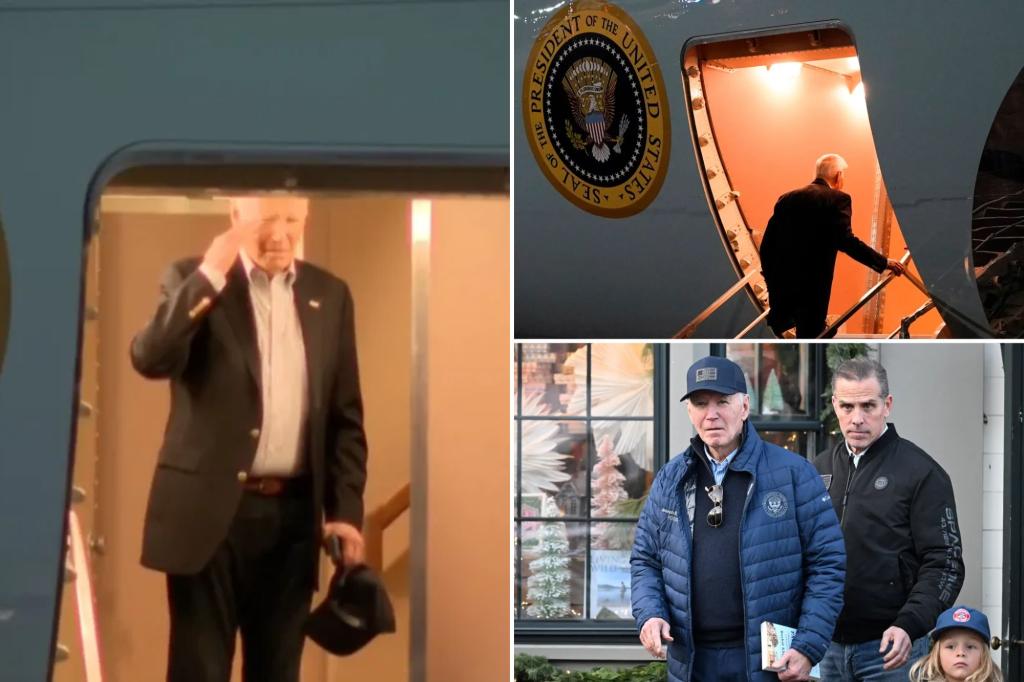On a recent Sunday evening, President Biden made his first public appearance since granting a presidential pardon to his son, Hunter Biden. As he boarded Air Force One for an official trip to Angola, the 82-year-old president greeted onlookers with a patriotic gesture, showing a thumbs up and blowing a kiss, although it remained ambiguous to whom these gestures were directed. This moment was particularly poignant given the backdrop of Hunter Biden’s legal troubles, and it drew attention to the delicate relationship between the president’s duties and his familial ties. Biden walked up the steps confidently, seemingly unfazed by the questions posed by reporters regarding the implications of the clemency he had just granted.
In a statement released earlier, President Biden defended his son’s actions, asserting that Hunter was “selectively, and unfairly, prosecuted.” This defense comes amid ongoing scrutiny surrounding Biden’s administration and its connections to Hunter’s business dealings abroad, particularly in Ukraine and with entities linked to the Chinese government. The intricacies of these relationships have sparked a House impeachment inquiry focusing on Biden himself, adding layers of complexity and concern over the ethical ramifications of his support for Hunter.
The decision to pardon Hunter Biden was met with significant controversy, even among members of Biden’s own party. Some Democrats voiced their discontent, arguing that the pardon undermines the president’s longstanding argument that Americans should uphold the legal system and trust it to fairly adjudicate cases. This sentiment reflects a broader concern about the potential implications of such a decision, which could set a precedent for future clemency grants that raise questions of fairness and equity under the law, regardless of familial relationships.
Colorado Governor Jared Polis provided a critical perspective on the pardon, suggesting that Biden’s action could ultimately tarnish the president’s reputation. He indicated that while it might be possible to empathize with Hunter’s struggles, it also holds true that nobody, including a president and his family, is exempt from the law. This sentiment underscores a fundamental principle of governance: accountability, which is vital to maintaining public trust in leadership. The concern expressed by Polis and others reflects a widespread hesitance about the moral implications of using presidential power to intervene in personal legal matters.
The case of Hunter Biden is particularly complex, intertwined with geopolitics and questions about the integrity of U.S. political figures. Hunter’s past business associations have been controversial and have raised alarms about potential conflicts of interest for his father. As Hunter navigated his legal challenges, Biden’s defense of him came against a backdrop of fierce political opposition and scrutiny, maintaining the delicate balance of a father’s support and a leader’s responsibilities.
As President Biden embarks on his trip to Angola, the developments surrounding Hunter’s pardon will likely continue to be a focal point of media attention and political discourse. The discussions surrounding the implications of the pardon signal broader conversations about justice, privilege, and the responsibilities of those in power. The episode highlights the enduring challenges of navigating personal and public responsibilities, especially for leaders, whose actions are scrutinized not just in relation to their policies but also to their familial connections. How President Biden manages these dualities in the coming months could significantly shape his legacy and impact the political landscape as his administration continues to address pressing global issues.

